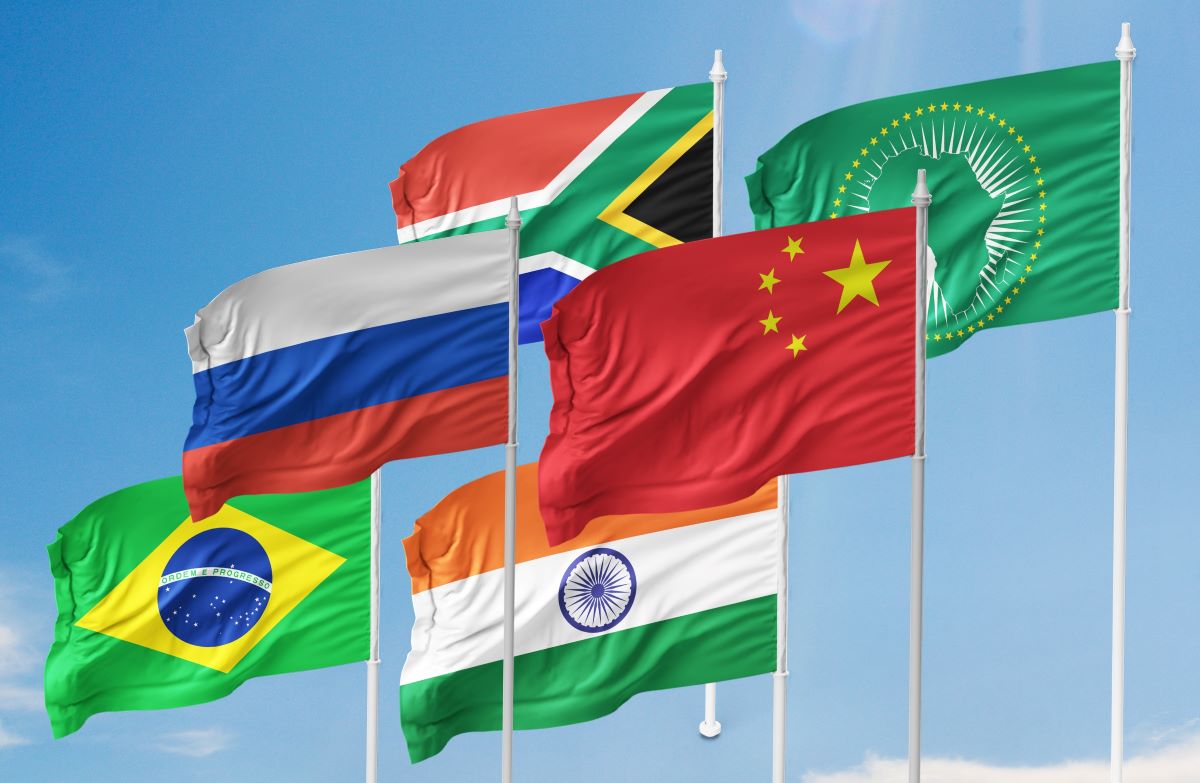The BRICS Summit convenes the leaders of emerging economies to discuss critical issues and strengthen cooperation while raising their influence on global affairs.
Furthermore, the summit provides an opportunity for the leaders to engage in bilateral and multilateral discussions on various topics. This includes economic collaboration, global governance, security, and people-to-people exchanges.
Several significant milestones and highlights marked the 15th BRICS Summit, held in Johannesburg, South Africa. However, the expansion of the group was at the top of the agenda.
In addition, the BRICS countries reached a consensus on the guiding principles, standards, criteria, and procedures necessary for the expansion process to take place.
What is BRICS?
The BRICS group comprises five countries: Brazil, Russia, India, China, and South Africa. It was first coined by an economist in 2001, pointing to these countries as the fastest-growing and potentially dominant forces in the global economy by 2050.
Originally referred to as BRIC, the group held its inaugural summit in 2009. The focus then was to increase their influence in the global financial sector and establish alternative systems to the Western-dominated international order.
In 2010, South Africa joined to complete the BRICS acronym. Since then, these countries have embraced the designation and formed a powerful geopolitical and economic bloc. Together, they account for over 42 percent of the world’s population and a quarter of the global economy.
Read: Saudi, UAE, among 6 countries agreeing to join BRICS
BRICS expansion
The expansion of BRICS welcomes six new members, marking a historic milestone that signifies solidarity and a determination to work together. Additionally, experts believe that this expansion will play a positive role in global governance.
The BRICS countries have extended invitations to Argentina, Egypt, Ethiopia, Iran, Saudi Arabia, and the UAE to join their ranks. On January 1, 2024, these countries will officially become members, marking a new starting point for cooperation.
Chinese President Xi Jinping said the expansion is a historic moment and a fresh beginning for BRICS cooperation. Moreover, he emphasized that this showcases the countries’ commitment to unity and collaboration with other developing nations.
Despite the MENA region grappling to reconcile improved bilateral ties between countries that had previously strained relationships, difficulties persist. However, experts suggest the addition of the four MENA countries could potentially enhance the bloc’s cooperative dynamics.
Michelle Grise, a RAND Corporation researcher, highlighted the reestablished relationships between UAE and Iran as well as Saudi Arabia and Iran. Her conjecture posits a scenario where these countries seamlessly coexist in the BRICS framework.
Further, Grise posited that BRICS membership could help Saudi Arabia and the UAE balance their relations with the United States while fortifying economic ties with China.
According to experts, the expansion goes beyond expectations, demonstrating the strong momentum of the BRICS mechanism. Furthermore, the increasing interest from developing countries in joining reflects their desire to enhance their influence and autonomy in global affairs.
Adoption of the Johannesburg II Declaration
Another milestone of this year’s edition of BRICS is the adoption the Johannesburg II Declaration. This declaration reaffirms the commitment of the BRICS countries to the core values and principles of the BRICS spirit. These include mutual respect, understanding, sovereign equality, solidarity, democracy, openness, inclusiveness, strengthened collaboration, and consensus.
In addition, a consensus was achieved on important partnerships. These aim to foster a peaceful and prosperous environment through inclusive multilateralism.
Similarly, these collaborative initiatives seek to further boost economic growth within the BRICS bloc. They also aspire to address global challenges with sustainable development, strengthen cultural and educational collaboration, and enhance institutional development.
De-dollarization aims
Aside from the expansion, reducing dependence on the US dollar has been another key focus of the BRICS Summit.
Russian President Vladimir Putin emphasized the process of “de-dollarization” and its irreversible nature in his address via video message. The leaders directed their finance ministries and central banks to explore national currency-based payment instruments.
The summit declaration emphasized using local currencies in international trade and strengthening correspondent banking networks. Experts believe that when major oil producers like Saudi Arabia and Iran join BRICS, the oil trade will easily undergo de-dollarization.
Iran already sells petroleum using currencies other than the dollar. Observers believe Saudi Arabia will likewise benefit from reducing its dependency on the dollar.
The New Development Bank
Moreover, the BRICS summit acknowledged the crucial role of the New Development Bank (NDB) in promoting infrastructure and sustainable development. It congratulated Dilma Rousseff, former President of Brazil, as President of the NDB and expressed confidence in her contributions to its development.
The leaders emphasized the NDB’s responsibility to provide effective financing solutions for sustainable development and expand its membership. To add to this, they highlighted the importance of improving corporate governance and operational effectiveness in line with the NDB’s General Strategy for 2022–2026.
Additionally, the summit recognized the valuable work of the BRICS Women’s Business Alliance and welcomed the participation of youth representatives.
Likewise, the summit reaffirmed the importance of people-to-people exchanges, fostering mutual understanding, friendship, and cooperation among the BRICS nations. It commended South Africa for hosting the 15th BRICS Summit as the BRICS Chair in 2023.
Furthermore, the bloc extended its full support to Russia for its upcoming role as the BRICS Chair in 2024.
Final thoughts
The BRICS Summit 2023 holds immense importance for the member countries and global affairs. As an economic bloc, BRICS plays a critical role in setting directions for future global economic policies. It can also provide suitable alternatives that can help the world achieve financial stability.
For more stories on the economy, click here.





